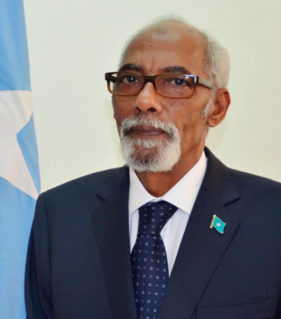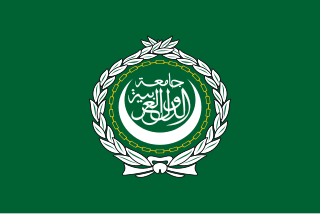
Foreign relations of Somalia are handled by the President as the head of state, the Prime Minister as the head of government, and the Minister of Foreign Affairs Federal Government of Somalia.
2020 (MMXX) will be a leap year starting on Wednesday of the Gregorian calendar, the 2020th year of the Common Era (CE) and Anno Domini (AD) designations, the 20th year of the 3rd millennium, the 20th year of the 21st century, and the 1st year of the 2020s decade.

Deutsche Welle or DW is Germany's public international broadcaster. The service is available in 30 languages. DW's satellite television service consists of channels in English, German, Spanish, and Arabic. While funded by the German government, the work of DW is regulated by the Deutsche Welle Act, meaning that content is always independent of government influence. DW is a member of the European Broadcasting Union (EBU).

DW-TV is a set of television channels provided by Deutsche Welle. The channels concentrate on news and information and first started broadcasting 1 April 1992. They are broadcast on satellite and produced in Berlin.

Foreign relations of the Republic of Somaliland are the responsibility of the Ministry of Foreign Affairs. The Republic of Somaliland. The region's self-declared independence remains unrecognised by the international community.

The Transitional Federal Government (TFG) was the internationally recognized government of the Republic of Somalia until 20 August 2012, when its tenure officially ended and the Federal Government of Somalia was inaugurated. The TFG was established as one of the Transitional Federal Institutions (TFIs) of government as defined in the Transitional Federal Charter (TFC) adopted in November 2004 by the Transitional Federal Parliament (TFP).

Aden Adde International Airport, Aden Abdulle International Airport, formerly known as Mogadishu International Airport, is an international airport serving Mogadishu, the capital of Somalia. It is named after Aden Abdullah Osman Daar, the first President of Somalia.

The African Union Mission in Somalia (AMISOM) is an active, regional peacekeeping mission operated by the African Union with the approval of the United Nations Security Council. It is mandated to support transitional governmental structures, implement a national security plan, train the Somali security forces, and to assist in creating a secure environment for the delivery of humanitarian aid. As part of its duties, AMISOM also supports the Federal Government of Somalia's forces in their battle against Al-Shabaab militants.
Various international and local diplomatic and humanitarian efforts in the Somali Civil War have been in effect since the conflict first began in the early 1990s. The latter include diplomatic initiatives put together by the African Union, the Arab League and the European Union, as well as humanitarian efforts led by the Office for the Coordination of Humanitarian Affairs (OCHA), UNICEF, the World Food Programme (WFP), the Puntland Maritime Police Force (PMPF) and the Somali Red Crescent Society (SRCS).

Galmudug, officially Galmudug State, is an autonomous region in central Somalia. It is bordered to the north by the Puntland region, to the west by Ethiopia, to the east by Somali Sea and to the south by Hirshabelle.

The 2009–present phase of the Somali Civil War is concentrated in southern Somalia. It began in early February 2009 with the conflict between the forces of the Federal Government of Somalia, assisted by African Union peacekeeping troops, and various militant terrorist groups and factions. The violence has displaced thousands of people in the southern part of the country. The conflict has also seen fighting between the Sufi Ahlu Sunna Waljama'a and Al-Shabaab.

The Federal Government of Somalia (FGS) is the internationally recognised government of Somalia, and the first attempt to create a central government in Somalia since the collapse of the Somali Democratic Republic. It replaced the Transitional Federal Government of Somalia on 20 August 2012 with the adoption of the Constitution of Somalia.

Mohamed Osman Jawari, also known as Mohamed Jawari or Osman Jawari, is a Somali attorney and politician. He is former Speaker of the Federal Parliament of Somalia. He also briefly served as acting President of Somalia in August and September 2012.

Himan and Heeb was an autonomous region in the Federal Republic of Somalia. Formed in 2008, its capital was the central town of Adado (Cadaado). In 2015 Himan and Heeb merged with Galmudug to form a much larger Galmudug which consists of Mudug and Galguduud regions.

The Presidency of Uhuru Kenyatta began on 9 April 2013 after being sworn in as 4th president of Kenya. He succeeded Mwai Kibaki. During his inaugural speech Uhuru promised economic transformation through vision 2030, unity among all Kenyans, free maternal care and that he would serve all Kenyans.

The inauguration of Edgar Lungu as the 6th President of Zambia took place on 13 September 2016. This was the second time Edgar Lungu took the oath after he first took office on 25 January 2015. Edgar Lungu took the oath alongside Inonge Wina as Vice-President of Zambia. The day of the inauguration was set as a public holiday in Zambia and Monday September 12 as a half working day.

Daniel Günther is a German politician of Christian Democratic Union of Germany (CDU). Since 28 June 2017 he serves as the Minister President of Schleswig-Holstein. Since 1 November 2018 he also serves as President of the Bundesrat.
On September 2, 2018, a suicide bombing took place in Mogadishu, Somalia.


















